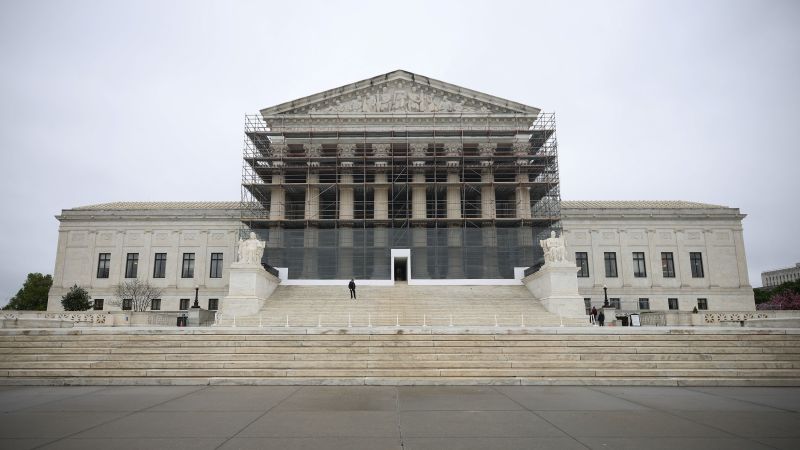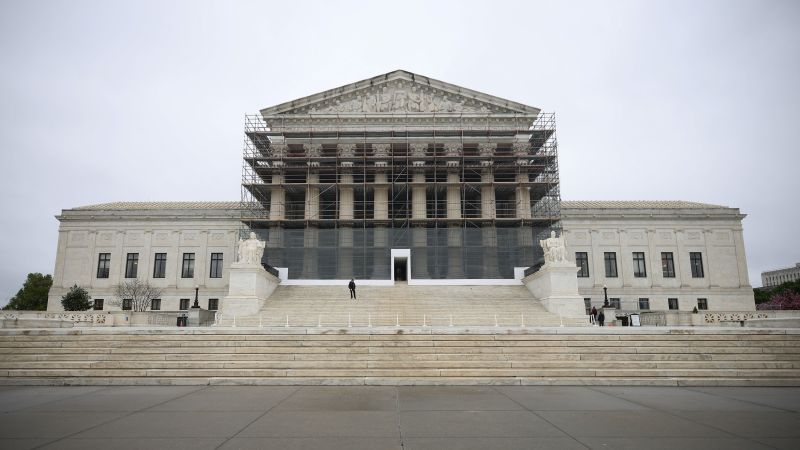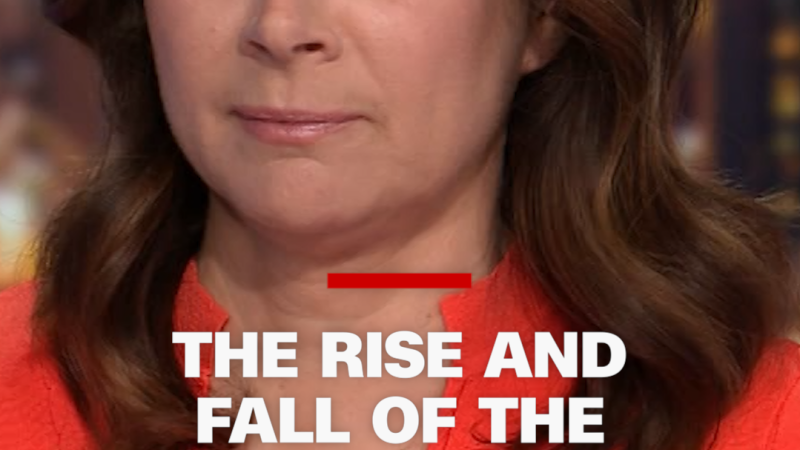Reverse Discrimination Lawsuit Changes After Supreme Court Ruling

Welcome to your ultimate source for breaking news, trending updates, and in-depth stories from around the world. Whether it's politics, technology, entertainment, sports, or lifestyle, we bring you real-time updates that keep you informed and ahead of the curve.
Our team works tirelessly to ensure you never miss a moment. From the latest developments in global events to the most talked-about topics on social media, our news platform is designed to deliver accurate and timely information, all in one place.
Stay in the know and join thousands of readers who trust us for reliable, up-to-date content. Explore our expertly curated articles and dive deeper into the stories that matter to you. Visit Best Website now and be part of the conversation. Don't miss out on the headlines that shape our world!
Table of Contents
Reverse Discrimination Lawsuit Landscape Shifts After Supreme Court Ruling: What You Need to Know
The Supreme Court's recent ruling in Students for Fair Admissions, Inc. v. President & Fellows of Harvard College has sent shockwaves through higher education and beyond, significantly altering the legal landscape surrounding affirmative action and, consequently, reverse discrimination lawsuits. This landmark decision, effectively ending race-conscious admissions policies in higher education, has opened a new chapter in the ongoing debate about fairness and equality, with potentially far-reaching implications for employment and other sectors.
The ruling itself doesn't directly address reverse discrimination claims per se, but its impact on affirmative action policies has created a ripple effect, emboldening individuals who believe they've been discriminated against due to their race or ethnicity in favor of underrepresented groups. This article examines the key changes, potential future litigation, and the evolving understanding of reverse discrimination in the wake of this momentous Supreme Court decision.
What is Reverse Discrimination?
Reverse discrimination refers to claims of discrimination against individuals belonging to majority groups (typically white or male) who allege they have been disadvantaged in favor of members of minority groups, purportedly as a result of affirmative action policies or other diversity initiatives. These claims often argue that such policies constitute illegal discrimination under Title VII of the Civil Rights Act of 1964 and other relevant legislation.
Before the Supreme Court ruling, the legal framework surrounding reverse discrimination lawsuits was already complex, with courts often grappling with the balancing act between addressing historical inequalities and ensuring equal opportunity for all. The Supreme Court's decision, however, has undeniably shifted the playing field.
Key Changes After the Supreme Court Ruling
- Increased Litigation Potential: The decision has likely emboldened individuals who feel they have been victims of reverse discrimination to pursue legal action. Law firms specializing in employment law are already anticipating a surge in such cases.
- Shifting Burden of Proof: While the burden of proof in discrimination cases remains on the plaintiff, the Supreme Court's decision may subtly shift the legal arguments. Defendants may find it more challenging to justify race-conscious policies as a means of achieving diversity.
- Focus on Individual Merit: The emphasis on individual merit and a colorblind approach to admissions and hiring is now central. This necessitates a more rigorous examination of individual qualifications and achievements, potentially leading to a closer scrutiny of selection processes in various sectors.
- Re-evaluation of Diversity Initiatives: Organizations are now reassessing their diversity, equity, and inclusion (DEI) programs to ensure compliance with the new legal landscape. This includes reviewing hiring practices, promotion procedures, and other policies that might be perceived as discriminatory.
Future Implications and Legal Strategies
The long-term impact of this ruling remains to be seen. Legal experts predict a rise in reverse discrimination lawsuits, particularly in higher education and employment. Future litigation will likely focus on the interpretation of the ruling's application beyond higher education and the development of alternative strategies for promoting diversity without explicit consideration of race.
The focus will likely shift towards demonstrating disparate impact, arguing that seemingly neutral policies have disproportionately negative consequences for certain groups. Statistical evidence and comparative analyses will become crucial in building strong legal cases.
Conclusion: Navigating a Changed Landscape
The Supreme Court's decision has undeniably altered the legal landscape surrounding reverse discrimination. While the ruling doesn't explicitly outlaw affirmative action in all contexts, it significantly restricts its application, leading to uncertainty and potential for increased litigation. Organizations and individuals must adapt to this new reality by carefully reviewing their policies and practices to ensure compliance with the law while striving to create inclusive environments. This will require a nuanced approach, focusing on holistic assessments of individual qualifications and exploring alternative strategies to promote diversity and equal opportunity. Staying abreast of legal developments and seeking expert legal advice is crucial for navigating this evolving landscape.
Disclaimer: This article provides general information and commentary on legal developments. It is not intended as legal advice. For specific legal guidance, consult with a qualified attorney.

Thank you for visiting our website, your trusted source for the latest updates and in-depth coverage on Reverse Discrimination Lawsuit Changes After Supreme Court Ruling. We're committed to keeping you informed with timely and accurate information to meet your curiosity and needs.
If you have any questions, suggestions, or feedback, we'd love to hear from you. Your insights are valuable to us and help us improve to serve you better. Feel free to reach out through our contact page.
Don't forget to bookmark our website and check back regularly for the latest headlines and trending topics. See you next time, and thank you for being part of our growing community!
Featured Posts
-
 Landmark Supreme Court Decision Eases Reverse Discrimination Lawsuits
Jun 06, 2025
Landmark Supreme Court Decision Eases Reverse Discrimination Lawsuits
Jun 06, 2025 -
 Wisconsin Man Convicted In Gruesome Murder And Dismemberment Of 19 Year Old
Jun 06, 2025
Wisconsin Man Convicted In Gruesome Murder And Dismemberment Of 19 Year Old
Jun 06, 2025 -
 Robinhood Hood Stock Performance 6 46 Increase Detailed June 3rd
Jun 06, 2025
Robinhood Hood Stock Performance 6 46 Increase Detailed June 3rd
Jun 06, 2025 -
 After Ketemas Casting Exploring Ryan Gosling As A White Black Panther In The Mcu
Jun 06, 2025
After Ketemas Casting Exploring Ryan Gosling As A White Black Panther In The Mcu
Jun 06, 2025 -
 From Success To Scandal Harry Enten On Mike Lindell And My Pillow Cnn
Jun 06, 2025
From Success To Scandal Harry Enten On Mike Lindell And My Pillow Cnn
Jun 06, 2025
Latest Posts
-
 Preventing Hospitalization The Importance Of Early Life Microbiome Development
Jun 07, 2025
Preventing Hospitalization The Importance Of Early Life Microbiome Development
Jun 07, 2025 -
 Environmental Emergency 2 000 Gallon Diesel Spill In Baltimore Harbor
Jun 07, 2025
Environmental Emergency 2 000 Gallon Diesel Spill In Baltimore Harbor
Jun 07, 2025 -
 Walton Goggins Heartfelt Reason Behind Instagram Unfollow Of Aimee Lou Wood
Jun 07, 2025
Walton Goggins Heartfelt Reason Behind Instagram Unfollow Of Aimee Lou Wood
Jun 07, 2025 -
 The Unexpected Costs Living A Double Life Between Two Homes
Jun 07, 2025
The Unexpected Costs Living A Double Life Between Two Homes
Jun 07, 2025 -
 Joint Military Operation In Gaza Recovery Of Israeli American Hostage Bodies Confirmed
Jun 07, 2025
Joint Military Operation In Gaza Recovery Of Israeli American Hostage Bodies Confirmed
Jun 07, 2025
